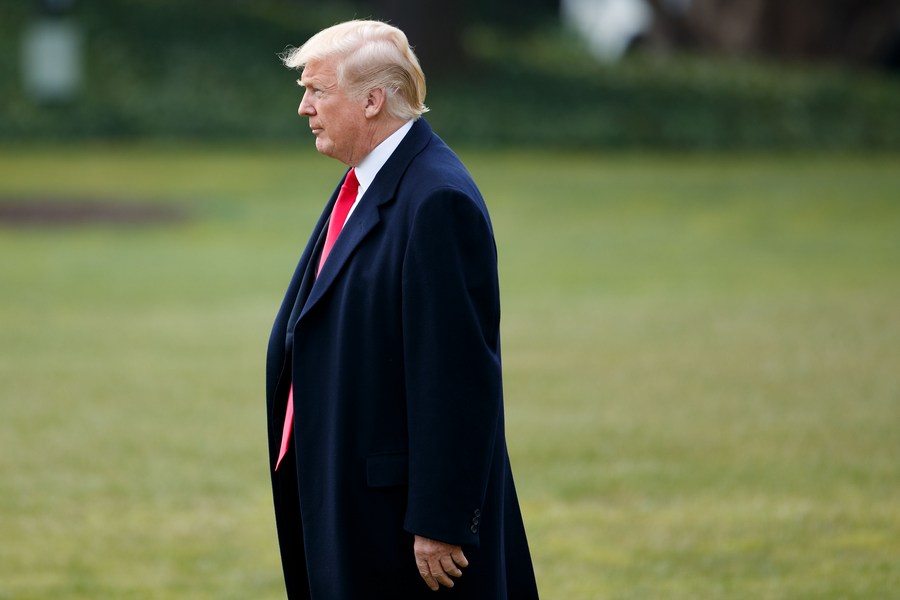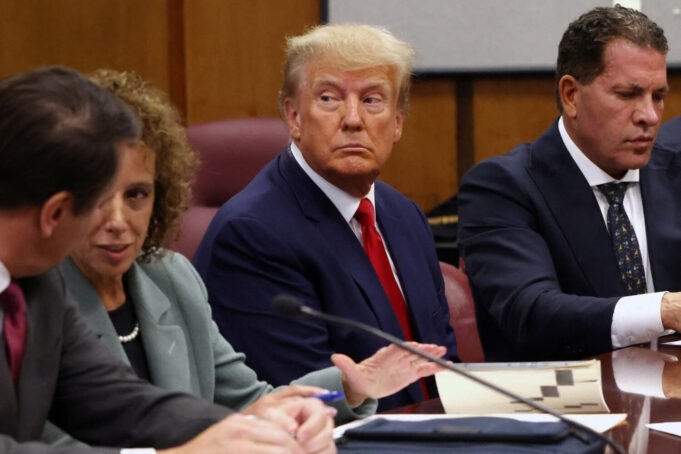If trump is convicted on all the 34 charges he could theoretically face 136 years in prison …reports Arul Louis
After he made history as the first former US President to be arrested, former President Donald Trump was hit with 34 serious criminal charges relating to hush money allegedly paid to three people.
Appearing in the New York State Supreme Court on Tuesday, he pleaded not guilty — a denial of the charges and a declaration to fight them.
The 34 criminal charges are each about falsifying business records for the payoffs made before the 2016 election to porn actor Stormy Daniels and Playboy model Karen McDougal, both of whom asserted that they had affairs with him, and the doorman at his Trump Tower, who claimed to have known about an illegitimate child Trump fathered.
If he is convicted on all the 34 charges he could theoretically face 136 years in prison — four years for each offence — under the creative way Manhattan prosecutor Alvin Bragg framed the charges breaking out separate transactions into individual charges.
Under New York’s legal system, a grand jury — a panel of citizens — investigated the case in secret hearings and voted on Thursday that there was a prima facie case against him, enabling Manhattan prosecutor Alvin Bragg to file charges.
Trump is the leading candidate for the 2024 Republican presidential nomination, and in a poll aggregation, he is only two points behind US President Joe Biden.
The next hearing in the case is set for December when the campaigns get heated and the trial could impinge in the race for the presidency.
The US Constitution does not bar an undertrial — or even a convict — from running for the President.

Trump is under at least three other investigations, two by federal authorities on his role in the attack on the US Congress by his rioting supporters in January 2021 and his handling of top secret documents, and a local investigation in Georgia State whether he tried to manipulate the 2020 presidential election result.
In a rambling speech to his supporters Tuesday night after returning home to Florida, he restated his versions that the case and the investigations were political persecutions and an “insult to the country”.
As he headed from his penthouse to the courthouse, he posted on his social media, “Seems so SURREAL — WOW, they are going to ARREST ME. Can’t believe this is happening in America.”
The scene of his arrest was indeed surreal as it was carried out under the watchful eyes of the Secret Service that is mandated to guard former Presidents.
After being booked without being handcuffed or asked to pose for identification pictures but made to give his fingerprints, he was taken to the courtroom of Acting New York State Supreme Court Justice Juan Merchan.
He did not react to TV reporters in the hallway and sat somberly at the defendant’s table flanked by his lawyers as he was formally charged.
The judge admonished him against making incendiary statements.
Trump had attacked the judge, saying that he hated Trump.
Merchan released him without bail and Trump left for a local airport from where he flew on his private Boeing 757 to his Mar-a-Lago home.
He arrived at the courthouse early afternoon in a black sports utility-type vehicle instead of a limousine in a motorcade with escort vehicles as news helicopters circled overhead.
In a park across from the courthouse supporters and opponents of Trump held opposing demonstrations, separated by barricades, exchanging insults but there was no violence.
A right-wing Republican member of the House of Representatives, Marjorie Taylor Greene had called for a protest there.
But she was shouted down by Trump opponents and fled.
Bragg, whose election was helped by an organisation that received $500,000 from George Soros, the billionaire activist who meddles in the internal affairs of countries around the world, including India, made the falsification of business records into felonies or serious crimes while they are usually treated as misdemeanours or minor offences.
He has, on the other hand, downgraded half of the serious violent crimes in Manhattan into minor offences, according to statistics from his office.
Explaining why he went for the more serious charges against Trump, Bragg said at a news conference, “Under New York state law, it is a felony to falsify business records with intent to defraud and intent to conceal another crime. That is exactly what this case is about: 34 false statements made to cover up other crimes.”
A prosecutor on Bragg’s staff said in court that Trump “falsified New York business records in order to conceal an illegal conspiracy to undermine the integrity of the 2016 presidential election and other violations of election laws”.
Trump’s lawyer Todd Blanche said that “Bragg has turned what is actually a completely political issue into a political prosecution”.
The hub of the cases against Trump is a series of payments that were made to his former lawyer Michael Cohen, who in turn paid off Daniels with $130,000 to silence her.
The prosecution alleges that the Trump business records falsely classified the payments as lawyer’s fees when in fact they were payoffs to Daniels.
Cohen was prosecuted by federal officials for tax evasion and federal election law violations and was sentenced to three years in prison.
He is the prime witness in the case against Trump.
Federal prosecutors as well as Bragg’s predecessor Cyrus Vance decided not to prosecute Trump.
The doorman’s case and that of Playboy model McDougal involve American Media Inc. (AMI), a magazine publisher, according to court documents filed by the prosecutors.
AMI made deals with the doorman and the model to stay silent and “falsely characterised” the payments on its books, the documents said.
Calling it a “‘catch and kill’ scheme”, Bragg said, “That is a scheme to buy and suppress negative information to help Mr. Trump’s chance of winning the election.”

Leave a Reply